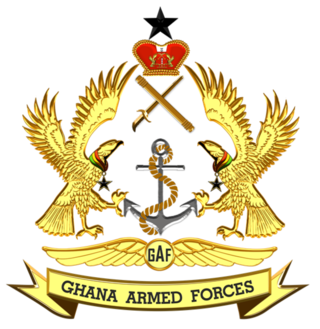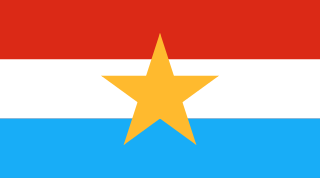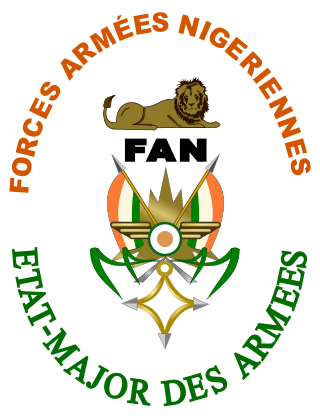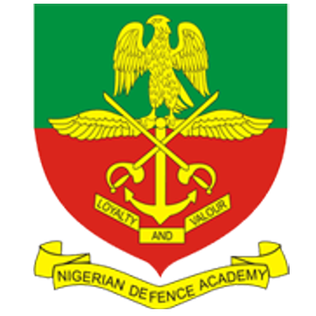
The Ghana Armed Forces (GAF) is the state military organisation of Ghana,consisting of the Army (GA),Navy (GN),and Ghana Air Force.

The Tatmadaw,also known as Sit-Tat,is the armed forces of Myanmar. It is administered by the Ministry of Defence and composed of the Myanmar Army,the Myanmar Navy and the Myanmar Air Force. Auxiliary services include the Myanmar Police Force,the Border Guard Forces,the Myanmar Coast Guard,and the People's Militia Units. Since independence in 1948,the Tatmadaw has faced significant ethnic insurgencies,especially in Chin,Kachin,Kayin,Kayah,and Shan states. General Ne Win took control of the country in a 1962 coup d'état,attempting to build an autarkic society called the Burmese Way to Socialism. Following the violent repression of nationwide protests in 1988,the military agreed to free elections in 1990,but ignored the resulting victory of the National League for Democracy and imprisoned its leader Aung San Suu Kyi. The 1990s also saw the escalation of the conflict involving Buddhists and Rohingya Muslims in Rakhine State due to RSO attacks on the Tatmadaw forces,which saw the Rohingya minority facing oppression and,starting in 2017,genocide.

The Niger Armed Forces includes military armed force service branches,paramilitary services branches and the National Police of Niger. The Army,Air Force and the National Gendarmerie are under the Ministry of Defense whereas the National Guard and the National Police fall under the command of the Ministry of Interior. With the exception of the National Police,all military and paramilitary forces are trained in military fashion. The President of Niger is the supreme commander of the entire armed forces. The National Assembly of Niger passed a statute for the Army of Niger in November 2020,planning for the army's size to increase from 25,000 personnel in 2020,to 50,000 in 2025 and finally 100,000 in 2030.

The Nigerian Armed Forces (NAF) are the military forces of Nigeria. The forces consist of three service branches:the Nigerian Army,Nigerian Navy,and Nigerian Air Force. The President of Nigeria functions as the commander-in-chief of the armed forces,exercising his constitutional authority through the Ministry of Defence,which is responsible for the management of the military and its personnel. The operational head of the AFN is the Chief of Defence Staff,who is subordinate to the Nigerian Defence Minister. With a force of more than 230,000 active personnel,the Nigerian military is one of the largest uniformed combat services in Africa. According to Global Firepower,the Nigerian Armed Forces are the fourth-most powerful military in Africa,and ranked 35th on its list,internationally.

The Uganda People's Defence Force (UPDF),previously known as the National Resistance Army,is the armed forces of Uganda. From 2007 to 2011,the International Institute for Strategic Studies estimated the UPDF had a total strength of 40,000–45,000,consisting of land forces and an air wing. Recruitment to the forces is done annually.

The United States Africa Command is one of the eleven unified combatant commands of the United States Department of Defense,headquartered at Kelley Barracks,Stuttgart,Germany. It is responsible for U.S. military operations,including fighting regional conflicts and maintaining military relations with 53 African nations. Its area of responsibility covers all of Africa except Egypt,which is within the area of responsibility of the United States Central Command. U.S. AFRICOM headquarters operating budget was $276 million in fiscal year 2012.

Owoye Andrew AzaziGSS DSS MSS CMH was a Nigerian army general who served as National Security Adviser to President Goodluck Jonathan,was Chief of Defence Staff (CDS) of Nigeria,and Chief of Army Staff (COAS). Before his first service chief appointment (COAS),he was General Officer Commanding (GOC) 1 Division,Kaduna State.

George Agbazika Innih was a Nigerian Army general and statesman. He was the military governor of Bendel and Kwara States.

The Nigerian Defence Academy (NDA) is a military university based in Kaduna,Nigeria,that trains officer cadets for commissioning into one of the three services of the Nigerian Armed Forces:the Army,the Navy,and the Air Force. The duration of training at the Nigerian Defence Academy is five years.

The Nigerian Army (NA) is the land force of the Nigerian Armed Forces. It is the largest component of the Nigerian Armed Forces. The President of Nigeria is the Commander-in-Chief of the Nigerian Army,and its professional head is the Chief of Army Staff,who is the highest ranking military officer of the Nigerian Army. It is governed by the Nigerian Army Council (NAC). The Nigerian Army is operationally and geographically divided into ten divisions,the basic field formation. The army has been involved in operations throughout the country,most especially during the Nigerian Civil War,and has undertaken major operations abroad. Nigerian Army officers have served as chiefs of defence in other countries,with Brigadier General Maxwell Khobe serving as Sierra Leone chief of staff in 1998–1999,and Nigerian officers acting as Command Officer-in-Charge of the Armed Forces of Liberia from at least 2007. The Nigerian Army is globally renowned for its professionalism and experience in counterterrorism and counterinsurgency;in 2022,the Nigerian Army won the award for the "Best Land Force in National Defence in Africa" in Banjul,Gambia.

Godwin Osagie Abbe in Benin City,Edo State,Nigeria is a retired Nigerian Army Major General and former Defence Minister of Nigeria from 2009 to 2010. He served as the Nigerian Minister of Interior from 2007 to 2009.
Sani Bello is a Nigerian statesman and military administrator who served as Governor of Kano State from 1975 to 1978. After his retirement,he amassed an enormous fortune through investments in oil,telecommunications and electricity;going on to establish the Sani Bello Foundation.
Christopher Oluwole Rotimi is a retired Nigerian Army brigadier general,diplomat and politician,he served during the Nigerian Civil War,and was the Governor of Western State while Nigeria was under military rule from 1971 to 1975. Oluwole Rotimi became the Nigerian Ambassador to the United States in 2007.

The Nigeria Police Force is the principal law enforcement and the lead security agency in Nigeria. It was designated by the 1999 constitution as the national police of Nigeria,with exclusive jurisdiction throughout the country. As at 2021,it had a staff strength of about 371,800. There are currently plans to increase the force to 650,000,adding 280,000 new recruits to the existing 370,000. The Nigeria Police Force is a very large organisation consisting of 36 State commands and Federal Capital Territory (FCT) grouped into 17 zones and 8 administrative organs. As at July 2024,the NPF is headed by IGP Kayode Egbetokun. In 2020,it underwent major overhauls.
John Nanzip Shagaya was a Nigerian senator and former military officer who was in April 2007 elected to represent the People's Democratic Party (PDP) in Plateau State as member of the Nigerian Senate for Plateau South. He ran for reelection in April 2011 on the Labour Party (LP) platform,but was defeated by Victor Lar of the People's Democratic Party(PDP). As a non commissioned officer (NCO) with the 2nd Reconnaissance Squadron in Abeokuta,he participated in the Nigerian counter-coup of 1966.
Dominic Obukadata Oneya was Administrator of Kano State,Nigeria from August 1996 to August 1998 during the military regime of General Sani Abacha,then Administrator of Benue State from August 1998 to May 1999 during the transitional regime of General Abdulsalami Abubakar,handing over power to the elected executive governor George Akume on 29 May 1999.
Garba Duba was a Nigerian Army Lieutenant general who was Governor of Bauchi State,Nigeria from July 1978 to October 1979 during the military regime of General Olusegun Obasanjo,and Administrator of Sokoto State from January 1984 to August 1985 during the military regime of Major General Muhammadu Buhari.
Lieutenant general Ipoola Alani Akinrinade is a retired Nigerian military officer who was Chief of Army Staff (COAS) from October 1979 to April 1980,and then Chief of Defence Staff until 1981 during the Nigerian Second Republic.
Ibrahim Ahmed Bako was a senior officer in the Nigerian Army who played a principal role in two Nigerian military coups:the July 1966 counter-coup and the December 1983 coup. The 1983 coup ousted the democratic government of Shehu Shagari while the July 1966 coup ousted the military government of General Ironsi. Bako was killed during the December 1983 coup d'état.

Training and Doctrine Command (TRADOC) supervises the training schools and combat development in the Nigerian Army. It is headquartered in Minna in the Niger State. TRADOC is charged with doctrinal training and combat development,supervising training centers. It also serves as a senior think-tank in Nigeria. TRADOC was formed in 1981 under the leadership of Major General Geoffrey Obiaje Ejiga,and currently supervises all the Army's schools,as well as an army depot. Before the establishment of the Nigerian Army Resources Centre (NARC) in 2015,TRADOC also served as a liaison centre for the Army.












